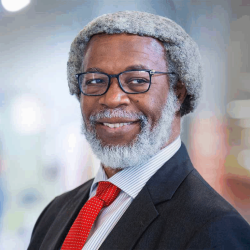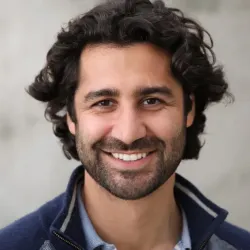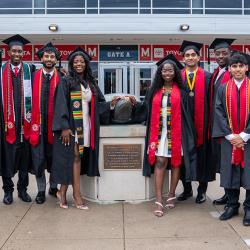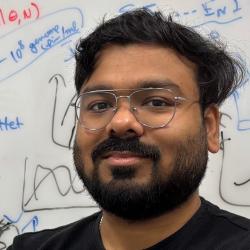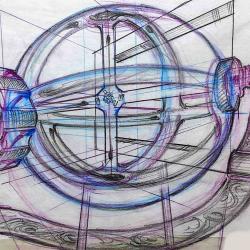Two UMD Faculty Members and Eight Alumni Elected 2015 Fellows of the American Physical Society
Two University of Maryland faculty members, Gretchen Campbell and Devarajan (Dave) Thirumalai, and eight UMD alumni were recently elected fellows of the American Physical Society (APS). The election of Campbell and Thirumalai brings the number of faculty in UMD’s College of Computer, Mathematical, and Natural Sciences (CMNS) who have received this honor to 60. Fellowships are awarded to no more than one-half of 1 percent of the society’s membership annually for exceptional contributions to the physics enterprise.
Campbell is a fellow of the Joint Quantum Institute, a joint research partnership between UMD and the National Institute of Standards and Technology (NIST). She is also a physicist in NIST's Quantum Measurement Division and a UMD adjunct professor of physics. Campbell was cited by the Atomic, Molecular and Optical Physics group for “pioneering contributions to the study of superfluidity in atomic-gas Bose-Einstein condensates using ring-shaped condensates.” A recipient of the Department of Commerce Bronze Medal in 2011 and a Presidential Early Career Award for Scientists and Engineers in 2013, her current research focuses on “atomtronics”—a new field of atom-based electronics. Campbell earned her B.A. in physics from Wellesley College in 2001 and her Ph.D. in physics from the Massachusetts Institute of Technology in 2006.
Distinguished University Professor Devarajan (Dave) Thirumalai of the Department of Chemistry and Biochemistry and the Institute for Physical Science and Technology was cited by the Biological Physics group for “pioneering applications of concepts from statistical mechanics and polymer physics in developing new computational tools and theoretical models that have greatly advanced our understanding of bio-macromolecules.” A fellow of the Royal Society of Chemistry and the Biophysical Society, Thirumalai’s research focuses on tackling a broad range of problems in biophysics using principles of statistical mechanics, polymer physics, and many computational techniques. He earned his B.S. in chemistry from the Indian Institute of Technology (Kanpur) in 1977 and his Ph.D. in physical chemistry from the University of Minnesota in 1982.
The eight CMNS alumni who were elected APS Fellows include:
Douglas Arion, (Ph.D. ’84, physics), professor, Department of Physics and Astronomy and professor of entrepreneurship, Carthage College, for “groundbreaking work towards improving the educational impact of the physics degree by promoting the widespread adoption of entrepreneurship training and mindset within the discipline.”
Lee Bernstein, (M.S. ’90, physics), professor, Department of Nuclear Engineering, University of California, Berkeley and staff scientist, Lawrence Livermore National Laboratory, for “work developing novel methods of determining neutron-nucleus cross sections via high-resolution γ-ray spectroscopy, the early development of surrogate ratio method, and the study of nuclear processes in high energy density plasmas at NIF.”
Zheng-Yu (Jeff) Chen, (Ph.D. ’88, physics), chair, Department of Physics and Astronomy, University of Waterloo, Canada, for “outstanding contributions to the theoretical study of wormlike polymer chains, in particular, spatially inhomogeneous and orientaionally ordered bulk and confined systems.”
Jaime Fernandez-Baca, (Ph.D. ’86, physics), group leader, Quantum Condensed Matter Division, Oak Ridge National Laboratory, for “seminal neutron scattering studies of magnetic materials, especially the spin and lattice dynamics of colossal magnetoresistive manganites.”
Ira Schwartz, (Ph.D. ’80, applied mathematics), section head, Nonlinear Systems Dynamics, Naval Research Laboratory, for “pioneering contributions to the understanding and development of topological insights into the dynamics, fluctuations, and control of strongly nonlinear physical and population systems.”
Michael Shay, (Ph.D. ’88, physics), professor of physics and astronomy, University of Delaware, for “pioneering contributions to understanding magnetic reconnection, including the nature of collisionless reconnection, and of plasma turbulence.”
Troy Shinbrot, (Ph.D. ’92, physics), professor of biomedical engineering, Rutgers University, for “creative and thought-provoking work on chaos, fluid mixing, and granular flows.”
Michael Wittmann, (Ph.D. ’98, physics), associate professor and chair of physics, University of Maine, for “foundational research into student learning of physics, pioneering work in K-12 teacher development, and leadership in building community for physics education researchers.”
APS fellows are nominated by society members, reviewed and evaluated by the unit and APS fellowship committees and elected by the APS Council of Representatives.
Media Relations Contact: Abby Robinson, 301-405-5845, abbyr@umd.edu
Writer: Mary Kearney
University of Maryland
College of Computer, Mathematical, and Natural Sciences
2300 Symons Hall
College Park, MD 20742
www.cmns.umd.edu
@UMDscience
About the College of Computer, Mathematical, and Natural Sciences
The College of Computer, Mathematical, and Natural Sciences at the University of Maryland educates more than 7,000 future scientific leaders in its undergraduate and graduate programs each year. The college's 10 departments and more than a dozen interdisciplinary research centers foster scientific discovery with annual sponsored research funding exceeding $150 million.



